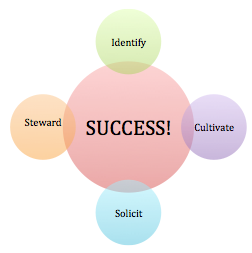Fundraising is Everyone’s Job
It’s my birthday. That’s not a particularly big thing in my life—I’ve never been the birthday girl type. Indeed, I have a hard time remembering my birthday let alone the birthdays of my kids and grandson. But this one is a little different. I’m 66. That sounds old, but I don’t feel it. It sounds like retirement, but I’m not ready. There are too many things I still want to accomplish; I have too much energy to simply stop.
In the past few years, as I’ve been building my consulting practice, I have honed in and  gotten more specialized, unlike a lot of my colleagues who still say they work with nonprofits and for profits on it all. I do fundraising. That is, I work with individuals and organizations helping them to fundraise more effectively. And, ironically, the more narrowly I have defined what I do, the broader the work I do has become.
gotten more specialized, unlike a lot of my colleagues who still say they work with nonprofits and for profits on it all. I do fundraising. That is, I work with individuals and organizations helping them to fundraise more effectively. And, ironically, the more narrowly I have defined what I do, the broader the work I do has become.
Fundraising, it turns out, touches everything. It not only helps to ensure the financial stability of an organization, but it also really does sit at the center of everyone else’s work. And the more the rest of the organization can see how fundraising is so much a part of their jobs, the more funds can actually be raised.
This past week I did a session on Admissions and Development at a conference given by BJE-LA for Jewish Day Schools. We spent 75 minutes talking about how these two groups should be tight buddies, partnering in so many ways.
This coming week, I’ll be out in the Inland Empire talking to the AFP group there about Building a Culture of Philanthropy at their organizations—and that reinforces the fact that the development department is not the sole owner of fundraising.
Fundraising, in fact, is everyone’s job, from the head of the organization to the janitor who empties the trash.
Not that everyone is going to ask others to make a gift. That is only a small part of the fundraising process. But everyone involved in your organization must—regularly and often—tell others about the impact of your work, about the terrific things you accomplish.
That doesn’t, mind you, mean listing every activity or each program in detail. Most of us would glaze halfway through that list. What it does mean is knowing how your work changes things and makes things better. It’s knowing your mission and understanding your vision.
Vision is something I’ve been thinking about lately. What is my vision for my organization? What changes—if any—am I anticipating over the next 3 to 5 years. How am I going to prepare for that as I continue today doing what I love to do? How do I make it possible for someone else to pick up where I will eventually leave off and build upon the edifice that I have created? I’m not, of course, just speaking personally. Janet Levine Consulting will either one day go away or be absorbed into someone else’s practice. I think I am years away from making that decision, but I am starting to think about how I can ensure a smooth transition, whatever way I decide to go.
Your organization most likely has larger issues to consider. And while succession planning is important for both of us, you also have to consider carefully ensuring that your successors have the financial wherewithal to continue making a difference for your clients and your cause. Whatever future your are envisioning for your nonprofit—unless closing down is the chosen option—you must ensure you're your fundraising plan is sustainable and scalable, and that means that everyone involved with what you do must know his or her fundraising job, and understand how to do that job well.
Janet Levine works with nonprofits, helping them to build fundraising capacity and build stronger, more confident and effective boards. Learn more at http://janetlevineconsulting.com. While there, sign up for our free monthly newsletter.
